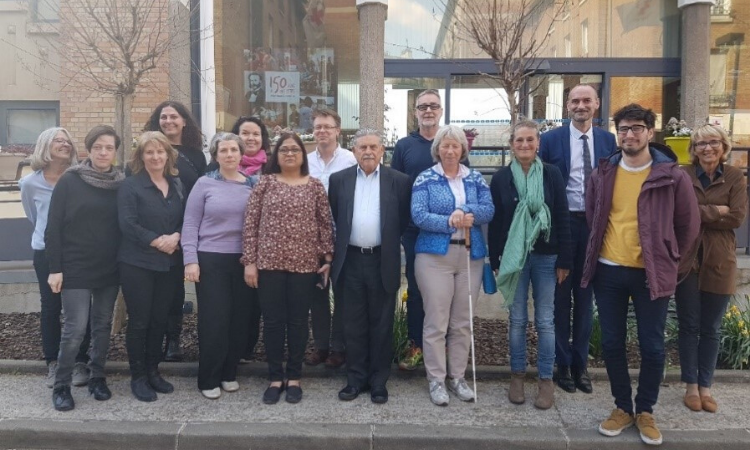EURORDIS Community Advisory Board Programme
Patient Community Advisory Boards (CABs) are groups established by patient advocates to discuss the latest developments, challenges and issues related to medical research in their disease area.
What is a Community Advisory Board (CAB)?
Patient Community Advisory Boards (CABs) are groups established and operated by patient advocates. They facilitate discussions (in a neutral setting) on the latest developments and challenges related to medical research and procedures in your disease area with the company or body conducting the research.

A CAB is a group of patients who offer their expertise to sponsors of clinical research. For example, by being involved before a clinical study starts, patients help ensure that clinical studies are designed to take into account their real needs, resulting in higher quality research.
CABs, with anywhere from seven to twenty patient advocate members, are involved in scientific as well as policy-related issues (ie, access). They provide expert advice to all stakeholders involved in the research, development and service provision of medical treatments.
CABs were created in the 90s for HIV/AIDS, hepatitis and breast cancer. Some rare disease European federations, with or without EURORDIS support, have already gained experience with CAB-like initiatives.
-
Does there need to be a CAB in my disease area?
For most of history, medical science has evolved with little to no input from the people being studied. CABs change that, and help to design, carry out and communicate on studies that are more rational and inclusive from a patient’s point of view. By doing so, a bond of trust between the patient and scientific community is formed.
-
What exactly do CABs give input on?
On a wide variety of topics that their members are the experts on: patient outreach, education on research, clinical studies and their design, criteria for participation, informed consent forms and processes, compassionate use programmes, retention of participants, and reporting on results. Input is also possible on disease-specific topics such as clinical endpoints and how they are measured, meaningful patient relevant outcomes (PROMs), disease registries and their common elements or factors that are meaningful to patients when measuring health and social outcomes.
-
Why now?
More than ever, patients and the patient perspective are seen as a way to make medical research and clinical studies more impactful and possibly quicker and certainly more efficient.
-
Who are CAB members?
CAB members are people living with the specific condition, a close family member or carer, and/or a member of a patient organisation that works with the disease.
-
How can I join a CAB in my disease area?
If a CAB for your condition exists, put yourself in direct contact with the group running the CAB. You can contact the patient organisation in your country or the European/ international federation for your disease to see if they are aware of an existing CAB for your disease. Any CAB should have open contacts, a vetting process and adhere to the Code of Practice for the Relations between Patients’ Organisations and the Healthcare Industry. If you are able to work in English, you are interested in science and interested in expanding the role of patients in research, you can dedicate at least two hours per week to the CAB, and you have a stable internet connection, you will be very welcome!
The EuroCAB programme managed by EUPATI Spain in partnership with EURORDIS
EURORDIS is pleased to announce that the EuroCAB programme will be moving forward under the auspices of EUPATI Spain. The programme will remain the same as designed and outlined here at EURORDIS but the day-to-day activities will move to Spain. Under EURORDIS’ guidance, 12 CABs have begun and are in different phases or stages of work with 102 active CAB members. 43 products have been discussed with patients and 36 studies have been and are being reviewed by patients! 22 pharmaceutical companies have been involved in 21 meetings in the last 4 years. And these numbers are constantly growing! Training on research is a major component of the EuroCAB programme and will continue to be!
Rob Camp will remain the touchpoint for the programme. EURORDIS will be part of a new EuroCAB Advisory Platform along with existing representatives of CABs now and in the future. We welcome this new phase of EuroCAB evolution and wish them all the best! In the next few weeks, the new EUPATI Spain website will have more information about how to join up, but in the meantime, feel free to write to Rob. From EURORDIS’ side, François Houÿez will be the main contact.
